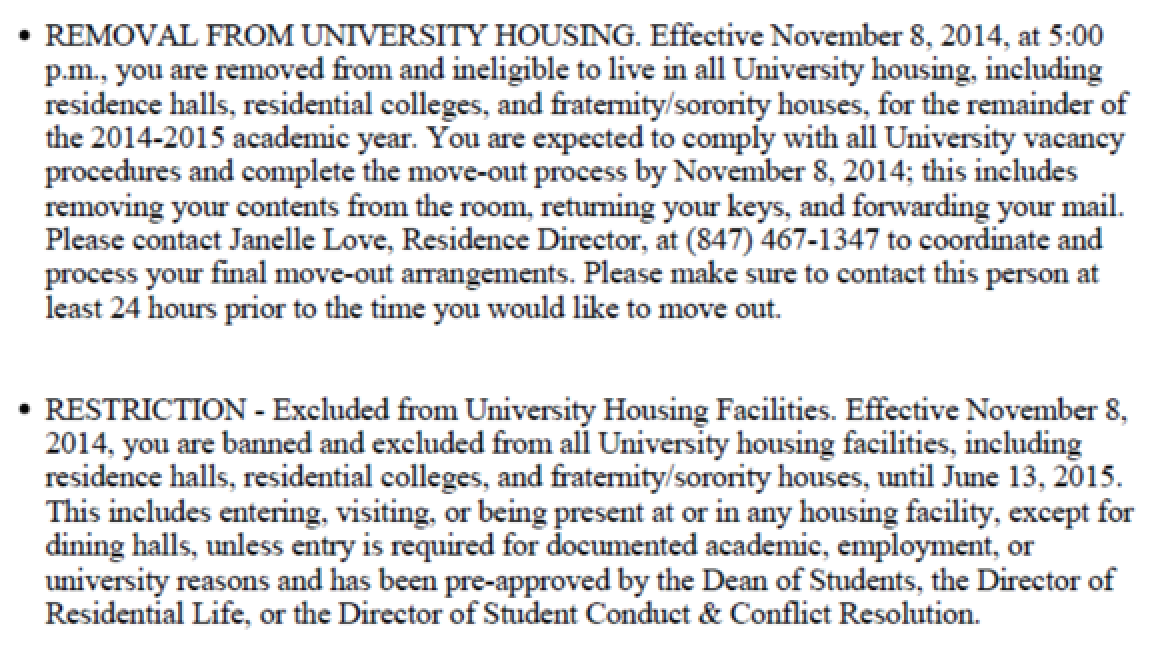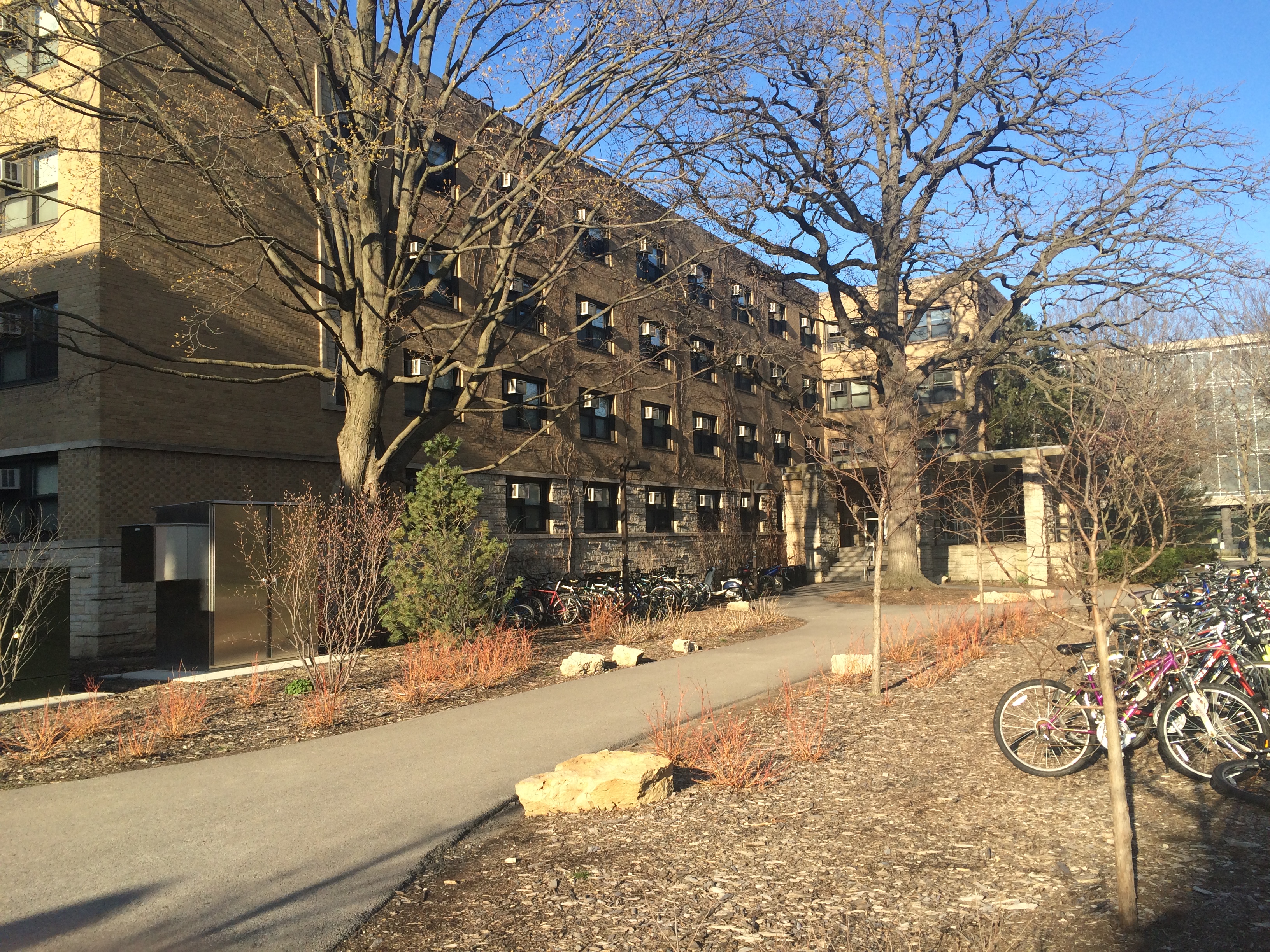His freshman year was going great – that is, until early November, when the Northwestern sophomore, who would like to remain anonymous, was removed from Chapin Hall. The reason? A night of drinking on his birthday. The situation became even worse when he overslept and missed his student conduct meeting.
The Office of Student Conduct informed him that he had seven days to pack and move off-campus. According to Paul Hubinsky, interim director of residential life, students whose behavior Student Conduct feels may impact the rest of the students in the building may be given as few as 48 hours to move out.
According to the student conduct office, eight students were removed from university housing and six were relocated to another dorm during the 2014-2015 academic year. Though that number may seem small, 296 students were on housing probation and 449 received a housing warning.

The student who had lived in Chapin had only been at Northwestern for two months, so he was given a couple of extra days to find a new place to live. Fortunately, he was helped out by a friend whose father lived nearby. Otherwise, he said he would have been forced to re-evlaute whether Northwestern was the best fit for him and withdraw from the university altogether due to the stress of the situation.
He was also banned from entering any residence on campus for the rest of the year. As a result, he said it was difficult to form relationships with other students living on campus.

Bobb Hall, one of 26 residence options on campus
Photo by Kevin Chan / North by Northwestern
Though he accepts full responsibility for his actions, he said he’s not pleased with how the situation was handled by Residential Services and Student Conduct.
“They were only interested in punishing wrongdoing with no apparent regard for the intentions or mental health of the student involved,” he said. “Kicking a student out of their home when they are in an extremely new environment is socially and emotionally scarring.”
Another sophomore, who would also like to remain anonymous, was removed from 1835 Hinman during his freshman year. After being written up twice for alcohol violations and once for a marijuana violation, he had to find a new place to live and write an essay explaining what he learned from being kicked out.
“It was a Tuesday, and I had five days to find housing. That was awful,” he said.
His search was difficult, but he managed to find an off-campus house through WildcatPad and Places4Students, two websites provided on Northwestern’s housing webpage. But despite the unfortunate situation, he notes the positives.
“The people who came to me and chilled with me in my house, which was several blocks away, really helped me to see who my real friends were,” he said.
What happens if you break the rules?
Policy violations are reviewed on a case-by-case basis, so there’s no concrete list of violations and their consequences. However, sanctions can range from a warning or probation to housing removal or even, in more severe cases, suspension or expulsion.
According to the student handbook, a housing warning is a “formal notice that a student’s actions violated a Housing policy,” which can lead to further disciplinary sanctions if another rule is broken.
“Housing probation typically happens when there is a violation that’s severe enough to warrant more than a warning, or if it’s a repeated violation from the same individual,” Hubinsky said.
But be careful. If you’re on housing probation (which lasts a minimum of one quarter) and have another conduct violation, you may have to bid goodbye to your dorm, or even all of on-campus housing altogether.
What could get you in trouble?
So what could get you into this situation? Obviously, getting caught drinking alcohol or smoking in your room are violations. But other prohibited items include coffee pots, blenders and microwaves. These may seem harmless, but depending on your resident assistant, the incident may be documented. First offenses will typically receive an advisory letter or warning, but if you are already on housing probation, past violations are taken into account and open the door to more severe consequences, Hubinsky said.
Possessing empty alcohol bottles is another commonly forgotten violation. Drinking games are also prohibited, regardless of the whether alcohol is actually present. So think twice about playing some friendly water pong in the lounge and toss that old, empty Grey Goose bottle in the trash.
Though most people know that pets aren’t allowed, they may be unaware of the consequences – a warning or even probation. You’ll also have to pay to repair any damages and have the room cleaned. But that’s not all. You may be required to write a reflection paper, work on a project with the residence director or RA staff or do community volunteer work, Hubinsky said.
How can you help your situation?
If you do end up getting caught breaking a rule, here’s some advice from both Hubinsky and former RA Brian Hallis, who graduated from Weinberg last spring: cooperate with your RA.
“A lot of times, just as long as you’re cooperative with your RAs in any certain situation, it is a lot better for you,” Hallis said.
Hallis was an RA in Elder Hall both his junior and senior years and said the RA staff and culture of the specific residence both play a role in how seriously the rules are enforced. For instance, a “typical partier in Bobb” may not fare as well in a quieter dorm such as Allison Residential Community or Hinman.
But overall, as long as you avoid violating policies (or avoid getting caught), your on-campus living experience should go smoothly.